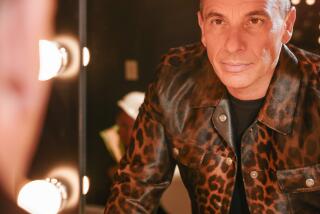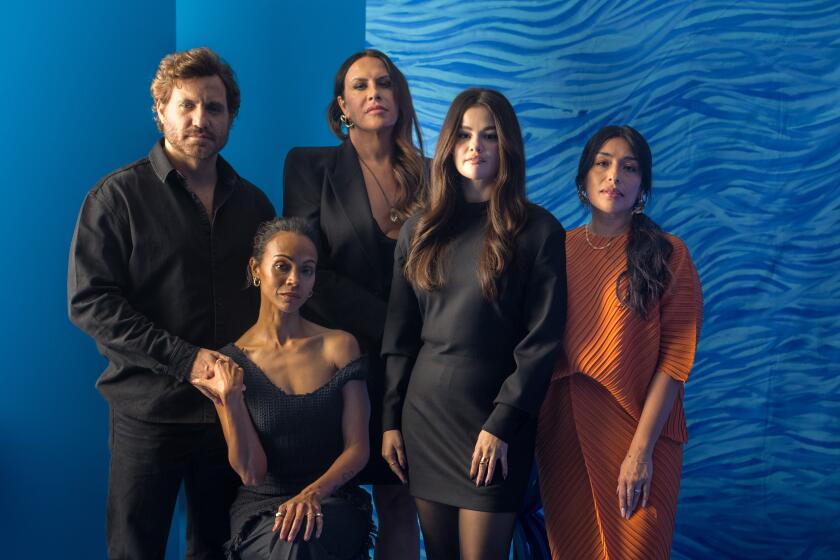For Robert De Niro, fears of obsolescence, channeled into ‘The Comedian’ and constant work
NEW YORK — From the moment he first appears in the new film “The Comedian” as the washed-up stand-up Jackie Burke — quixotically self-loathing, unapologetically hacky, at times ferociously funny — Robert De Niro’s presence poses a question. Is the actor hashing out an alternative view of performance, a kind of road-less-traveled of his own career?
This is, after all, a man who came to public attention more than 40 years ago in gritty pictures like “Mean Streets,” “The Godfather Part II” and “Taxi Driver” and has averaged nearly two Oscar nominations — and a half-gazillion roles — each decade since. Perhaps this feisty burnout is what De Niro feels could have been had his life gone a different way?
“I thought it was such a great idea to do a comedian,” the actor said. “That has never really been done before. Maybe ‘The Entertainer’? Not like this. And a comedian can do things that are more outrageous even if it’s not my personal taste. That was my attraction.”
Interviewing De Niro has always been a certain kind of challenge. It’s not that the actor isn’t trying to accommodate; he is. It’s just that he doesn’t want to give you anymore sentences than he has to, the verbal equivalent of a passenger on a smoky airplane making a beeline for the emergency exit. And those sentences tend to be more factual than interpretive. De Niro in an interview pretty evidently would rather be doing something else — an endearingly honest turn in this age of actor slickness and glad-handing. If the positions were reversed and you were on the other side of the table, his demeanor implies, would you want to be sitting here answering all these questions?
But push the actor a little more and some autobiographical truths emerge. “The Comedian,” which opens today, is directed by Taylor Hackford and conceived by veteran producer Art Linson. It centers on what happens when Burke is sent to jail for attacking a heckler and has to rebuild his life, even as he’s the one who keeps tearing it down.
Leslie Mann stars opposite De Niro as a woman with some rage and life issues of her own. Also turning up are veteran performers Danny DeVito, Edie Falco, Harvey Keitel and Patti Lupone. Stand-up set pieces dot the movie, often with Jackie lashing out at people who want him to reprise a long-ago sitcom character — a lashing out that reaches its pinnacle in a wild, impromptu insult-comedy set at an old age home.
A longtime passion project for De Niro, “The Comedian” shows a man making very mean jokes out of a deep sense of terror. If the film is not about what could have been for the actor, it may just reflect his fear about what could still be.
“It’s about a guy getting older, a guy who didn’t really make it and got stuck in his character. He’s getting older, getting marginalized, as time goes by.”
Does that resonate?
“That’s real.”
Is that something you think about?
“You can’t not think about it.”
As De Niro works in his office the day after Thanksgiving weekend, it’s hard to imagine those fears taking root. He is wearing khakis and a polo shirt, in blue slipper-shoes and sporting a distinctly professorial white-flecked-with-gray beard. He speaks softly, even shyly, a contrast with many of his signature roles and certainly the bombast of Jackie Burke.
Around him are piles of scripts and notes. It is an airy, wood-heavy space high above a street in Tribeca, the walls plastered with dozens of framed photos (family, Muhammad Ali and everyone in between).
As a tacit rebuttal to that fear of irrelevance — or perhaps a more conscious response to it — he is working constantly. Even at 73, De Niro rarely takes a break. (“Why? What else am I going to do?” he says with the volume and forthrightness of a man who has been asked the question, by various people in his life, many times before.) After the holidays he’ll begin shooting “War With Grandpa,” an intergenerational family comedy based on Robert Kimmel Smith 1980s-era children’s book. He’ll then reunite with mutual muse Martin Scorsese for the much-anticipated “The Irishman,” about the mobster with knowledge about the death of Jimmy Hoffa.
Then he’ll return to his other, slightly more latter-career muse, David O. Russell, for an Amazon series the “American Hustle” director is plotting. Yep, De Niro is in the streaming game.
Typecasting is a big theme of “The Comedian.” Jackie is constantly being browbeaten into a signature line from his now several decades-old TV show “Eddie’s Home.” One’s brain doesn’t need to work overtime to imagine its parallels to De Niro’s own life and the “You talking to me” Travis Bickle moments he surely has encountered from fans and strangers over the years.
He doesn’t acknowledge it specifically but says, “That’s always there, people trying to get you to do something similar to what you’ve been done before. That’s a built-in thing.”
Just the same, he says, it doesn’t give him pause about a project like “Irishman.”
“With certain things, if they’re well done, there are so many ways to do it. I actually had to convince Marty. He was going to do another genre piece about an aging hitman. And I read [Charles Brandt’s ‘Irishman’] book and said, ‘Maybe we should move in that direction and let go of that other thing.’ ”
De Niro continued. “It’s big film world out there. You can tell many stories that have a lot of validity.”
Actors of a certain age tend to fall into roles they’ve done before, in part because that’s what comes their way, but also because when you’ve been around that long and done that much, repetition is inevitable.
De Niro, though, seems to be seeking ways to avoid that. He done comparatively less comedy over most of career, for instance, with the notable exceptions of the “Analyze This” and “Fockers” franchises. Even as one of his most famous roles, 1983’s “The King of Comedy,” suggests jocularity, it’s, in fact, more of a drama.
Lately, though, De Niro has been cranking out broad comedies — “Dirty Grandpa,” “Last Vegas” and “The Intern” — delighting some but landing more awkwardly with those who hold dear his gritty early-career roles. Now, with “The Comedian,” comes his most explicit take on the subject of comedy, a movie that’s both jokey and a deconstruction of the art.
He says the idea of performing stand-up on camera made it different from any comedy he’s done before. “Even though the [audience is made up of] extras, you can feel like you’re dying out there if they don’t laugh. You want a reaction.”
The past few months he’s also been shuttling uptown, to Broadway, to help with “A Bronx Tale,” a musical based on his 1993 Chazz Palminteri-starring directorial debut that also opens this weekend. (De Niro is codirecting with Jerry Zaks.) And he’ll be seen this May in “Wizard of Lies,” an HBO movie about Bernie Madoff he finished last year. (“You’re not looking at him as a villain. He’s a villain in other people’s eyes. Everyone has their reasons, and he had his reasons.”) The actor also says he recently met with Paul Thomas Anderson; let that one linger a minute.
And getting behind the camera himself is still a possibility.
“I always said I’d like to direct five. Maybe I’ll direct three. It just has to be worth it to put the time and energy.”
Devotees will remember his last film and sophomore effort, 2006’s “The Good Shepherd,” a sprawling, surprisingly ambitious story of the early Cold War, with Matt Damon and Angelina Jolie; De Niro said he had long harbored hopes of a follow-up but realizes now that probably won’t happen.
His production company, run by longtime collaborator Jane Rosenthal, remains very active. And the Tribeca Film Festival, which he oversees in the same kind of eminence grise role as Robert Redford does Sundance, is going strong more than 15 years on.
Incidentally, he says he has no regrets about trying to program “Vaxxed,” an antivaccine movie from the controversial Andrew Wakefield, that De Niro personally included in the lineup, in part motivated by the autism of his 18-year-old son Elliot, and then pulled after a loud backlash. (“They’re still putting mercury in some vaccines, as I understand it. I don’t understand why a filmmaker — because it was a filmmaker in the festival who complained — would care about another movie in the lineup. Even if there are questions about [Wakefield’s] integrity, I don’t see why that should matter if the movie is raising important questions.”)
That incident threatened to tarnish what has been a relatively clean legacy, angering the many who feel the antivaccine movement is stuff of the conspiracist fringe. De Niro seems unconcerned with legacy and says his only regrets are movies that didn’t do as well as he had hoped. He remains slightly annoyed, for instance, at the poster and marketing materials for “Bronx Tale,” which he thought could have been more effective.
When asked about a long career of hits and inevitable misses — and any regrets on the latter — he names, rather unexpectedly, “Everything’s Fine,” a mostly forgotten holiday dramedy circa 2009 that received mixed reviews. The film had the misfortune of coming out after the financial crisis and at a period of transition for the Weinstein Co. “Everyone did such a great job. I wished [Weinstein] had done more.”
But he says he mostly just wants to work, not look back. Reminded that he had said upon the release of “Silver Linings Playbook” a few years ago that he had hoped to tackle many more father and grandfather roles, he gave a knock on the wooden table in front of him.
“Keep pushing the rock up the hill,” he said, then showed a reporter out and returned to a script.
See the most-read stories in Entertainment this hour »
On Twitter: @ZeitchikLAT
More to Read
Only good movies
Get the Indie Focus newsletter, Mark Olsen's weekly guide to the world of cinema.
You may occasionally receive promotional content from the Los Angeles Times.











